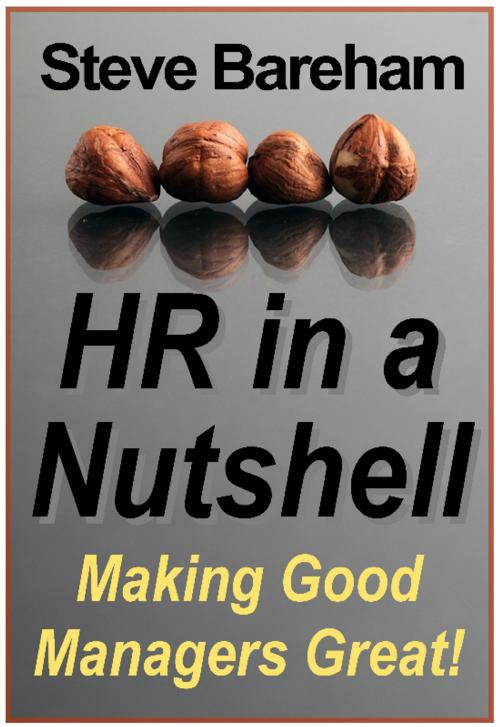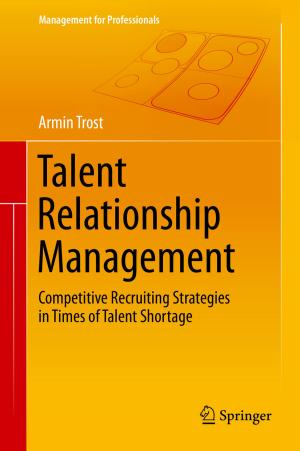HR in a Nutshell
Making Good Managers Great!
Business & Finance, Human Resources & Personnel Management| Author: | Steve Bareham | ISBN: | 9780973113761 |
| Publisher: | Summa Publishing | Publication: | June 25, 2012 |
| Imprint: | Language: | English |
| Author: | Steve Bareham |
| ISBN: | 9780973113761 |
| Publisher: | Summa Publishing |
| Publication: | June 25, 2012 |
| Imprint: | |
| Language: | English |
Staff members determine the success of any organization, and since staff members are people, they don’t behave the same way. This means managers have to be amateur psychologists when they hire, interview, orient, train, coach, discipline, and evaluate performance. But how many managers have specific human resources training? Human resources is like any other discipline; it requires study of proper processes to gain knowledge, and then practice to turn knowledge into skills. No one is born a great manager. This book is designed as a “nothing but the facts” short course. Each vital human resources area is covered, from analysing jobs, to writing job descriptions, to hiring, interviewing, training, orienting, evaluating performance, to termination. Key processes are covered in ten pages or less, so you can acquire the knowledge you need quickly, without having to wade through a 700-page academic text. This book is written as a unique short course to benefit: • business owners who manage staff • managers, and aspiring managers, who wish to boost career advancement potential by gaining additional human resources knowledge • post-secondary management program students (vital information and short!) • anyone interested in an HR career who wants to quickly learn what’s involved • researchers needing succinct human resources information • staff working for anyone who reads the book and who applies its premises Good human resources practises make everyone happier because people are hired correctly in the first place, they know how to do what they were hired to do, and progressive communication channels are firmly in place from the start of the HR program to the end! Every business or organization that employs more than five people should have a human resources management program in place. This isn’t to say that small employers need a full-fledged HR department, rather that at least one person on staff should be educated and trained to plan and implement HR processes such as those described in this book. Further, even though one person may assume responsibility for HR oversight, every manager who supervises any number of people should be required to study and understand time-proven human resources strategies and tactics in the interest of good employee morale and high productivity. Good employers and great managers understand human resources concepts. It’s never accidental when businesses and organizations achieve maximum productivity from a highly motivated staff. Nor is it serendipity when employees like working someplace so much that they never want to leave. Low turnover is always a good sign, as it is when talented individuals seek a business out as a preferred employer. Excellent organizations have clear visions, defined purposes, good values, and comprehensive human resources management programs that keep pace with people and changing times. If you’re a business owner, manager, aspiring manager, or student of management, this is indispensable information. Includes links to more than 20 PowerPoint slide and instructional videos. • What Truly Competent Managers Know: 13 critical HR knowledge and skill areas • Quantifying HR value • HR and Total Quality Management: capitalize on the wisdom of Edward J. Deming • Guiding Statements for Focus and Clarity: vision, purpose, and values boost performance and morale • Job Analysis: how many staff members do you need? Vital information. • Job Descriptions: Keep everyone on track. • Employee Recruitment: Attract the best; it’s getting competitive out there! • Employee Selection, Interview and Reference Checking: proven system reduces hiring mistakes. • Employee Orientation: start them off on the right foot and they’re more likely to stay that way. • Employee Training: Spot knowledge and skills deficiencies early and address them proactively. • Employee Motivation and Coaching: managers can be, and should be, coaches; it’s part of the job. • Employee Retention: it’s expensive to be forever on a hiring treadmill; keep them once you’ve got them. • Performance Evaluation: needn’t be a trip to the dentist; they should improve performance. • Progressive Discipline: right ways. • Termination Processes: stay on the right side of the law. • Labour Trends, Compensation, Benefits: what’s new?
Staff members determine the success of any organization, and since staff members are people, they don’t behave the same way. This means managers have to be amateur psychologists when they hire, interview, orient, train, coach, discipline, and evaluate performance. But how many managers have specific human resources training? Human resources is like any other discipline; it requires study of proper processes to gain knowledge, and then practice to turn knowledge into skills. No one is born a great manager. This book is designed as a “nothing but the facts” short course. Each vital human resources area is covered, from analysing jobs, to writing job descriptions, to hiring, interviewing, training, orienting, evaluating performance, to termination. Key processes are covered in ten pages or less, so you can acquire the knowledge you need quickly, without having to wade through a 700-page academic text. This book is written as a unique short course to benefit: • business owners who manage staff • managers, and aspiring managers, who wish to boost career advancement potential by gaining additional human resources knowledge • post-secondary management program students (vital information and short!) • anyone interested in an HR career who wants to quickly learn what’s involved • researchers needing succinct human resources information • staff working for anyone who reads the book and who applies its premises Good human resources practises make everyone happier because people are hired correctly in the first place, they know how to do what they were hired to do, and progressive communication channels are firmly in place from the start of the HR program to the end! Every business or organization that employs more than five people should have a human resources management program in place. This isn’t to say that small employers need a full-fledged HR department, rather that at least one person on staff should be educated and trained to plan and implement HR processes such as those described in this book. Further, even though one person may assume responsibility for HR oversight, every manager who supervises any number of people should be required to study and understand time-proven human resources strategies and tactics in the interest of good employee morale and high productivity. Good employers and great managers understand human resources concepts. It’s never accidental when businesses and organizations achieve maximum productivity from a highly motivated staff. Nor is it serendipity when employees like working someplace so much that they never want to leave. Low turnover is always a good sign, as it is when talented individuals seek a business out as a preferred employer. Excellent organizations have clear visions, defined purposes, good values, and comprehensive human resources management programs that keep pace with people and changing times. If you’re a business owner, manager, aspiring manager, or student of management, this is indispensable information. Includes links to more than 20 PowerPoint slide and instructional videos. • What Truly Competent Managers Know: 13 critical HR knowledge and skill areas • Quantifying HR value • HR and Total Quality Management: capitalize on the wisdom of Edward J. Deming • Guiding Statements for Focus and Clarity: vision, purpose, and values boost performance and morale • Job Analysis: how many staff members do you need? Vital information. • Job Descriptions: Keep everyone on track. • Employee Recruitment: Attract the best; it’s getting competitive out there! • Employee Selection, Interview and Reference Checking: proven system reduces hiring mistakes. • Employee Orientation: start them off on the right foot and they’re more likely to stay that way. • Employee Training: Spot knowledge and skills deficiencies early and address them proactively. • Employee Motivation and Coaching: managers can be, and should be, coaches; it’s part of the job. • Employee Retention: it’s expensive to be forever on a hiring treadmill; keep them once you’ve got them. • Performance Evaluation: needn’t be a trip to the dentist; they should improve performance. • Progressive Discipline: right ways. • Termination Processes: stay on the right side of the law. • Labour Trends, Compensation, Benefits: what’s new?















